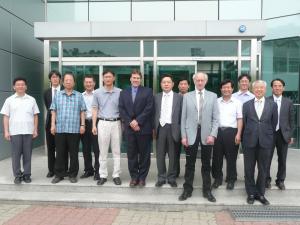How to store the fusion fuel
11 Jun 2010
-
David Babineau, Tritium Plant Section Leader
A two-day bilateral meeting between representatives of ITER's Fuel Cycle Division and ITER Korea was held in Daejeon, Korea this week to review the requirements to design the storage and delivery system within the Tritium Plant and fuel cycle. The main purpose of this meeting was to compare the merits and demerits of zirconium cobalt (ZrCo) as the hydride material to those of depleted uranium.
Hydrides are materials—metals in this case—that have the capability of chemically absorbing hydrogen (and its isotopes deuterium and tritium) into their metal lattice structure, thereby acting as a very effective pump at room temperature. Metal hydrides typically store hydrogen at densities higher than in liquid hydrogen. In order to recover the hydrogen (or the deuterium tritium fuel) these metal hydrides must be heated, making them a very safe way to store and deliver tritium and therefore will be used for storage instead of tanks which store hydrogen as a gas.
Since the beginning of the engineering activities for ITER in the 1990s the question of the most suitable metal hydride material is controversially discussed among the experts. During the bilateral meeting, the Korean and ITER teams discussed the pro's and con's for the two candidate materials, weighting criteria such as complexity of the components and system design, schedule, costs and additional need for R&D, giving highest priority to safety aspects.
The meeting concluded with a unanimous preference for depleted uranium. Now it is time to come to a decision about the material that should be used as hydride in ITER.


